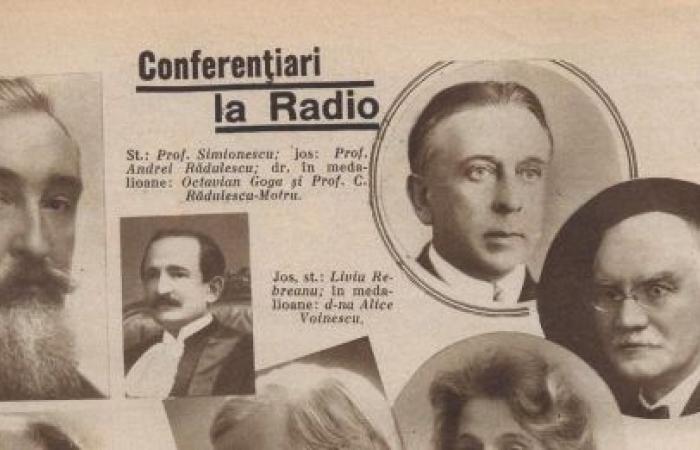Author: Alexandru Eduard Balaci
Motto:
“Mr. V. Voiculescu, the Romanian verse poet, simply glazed but with arcs wasted in azure, here is a living eye, open to what is going on in the laboratory of broadcast programs.
The village clock enjoys its direct and close care. The word and the song, twinned to be sent soul food to the peasants between the fields and forests. […] Children’s time adds its joys under the hand of Mr. V. Voiculescu. Children’s plays flourish and grow under his watchful eye. […] The conferences pass through the intellectual customs of the author of “The Shadow”. Radio University is headed by an editor of great honor.
The literary personality of Mr. Vasile Voiculescu lasts slowly, but thoroughly. The volume of poems “Pârga”, “Poeme cu ingeri”, then “Destiny” and finally “Urcuş”, here are towering pillars encrusted in marble for a temple of true poetry. “Bear’s Girl” and “Umbra”, two plays performed at the Bucharest National Theatre, complete the artistic measure of our writer, skilled with words, in love with folk language and epic.” (Radiofonia magazine from August 1, 1937, N. Papatanasiu, article “V. Voiculescu, Radiophonic medallions).
On April 26, 1963, Vasile Voiculescu (real name: Vasile Costache Voicu), doctor and writer (poet, prose writer, playwright) passed away. from 1930 he initiated a permanent column for villagers, “Program for villages”, which would become “Ora satelu” (in which he was present both as a doctor, with specialist advice, and as a reporter of rural news) at the Romanian Radio Broadcasting; he also constantly collaborated on the show “Universitatea Radio”; after 1944 he participated in the literary meetings of the “Burning Rug” group at the Antim Monastery in Bucharest; in August 1958 he was arrested, being released in May 1962, less than a year before his death; post-mortem member of the Romanian Academy since 1993.
Doctor, poet, writer, journalist
Vasile Voiculescu was born on November 27, 1884 in Pârscov commune, Buzău county. He was the son of Costache Voicu and Sultana Hagiu. Later, the writer took the name of Voiculescu. He started school in the village of Pleșcoi, Buzău, where he also graduated from primary school, after which he attended high school at Alexandru Hâjdeu High School, then at “Gheorghe Lazăr” High School in Bucharest.
He enrolls in the Faculty of Letters and Philosophy, which he will soon abandon at the insistence of his relatives and moves to the Faculty of Medicine in Bucharest, which he graduates, and in May 1910 he holds his license. Followed by trips around the country, where he practiced his profession with passion and devotion.
He married Maria Mitescu, also a student of Medicine, the woman with whom he will stay all his life and with whom he had five children.
In 1910, he defended his doctoral thesis “Intestinal resection with end-to-end suture in strangulated hernias”. Until 1917, he practiced medicine in several rural areas: Ocolul (Gorj county), Bezdead and Tătărani (Dâmboviţa county), Buftea, Budești (Ilfov county). He participated in the campaigns of 1913 and 1916-1917, in the First World War, being a military doctor in Bârlad. In 1918, he was appointed physician to the Crown Domains. From 1922 he worked as a doctor and professor at the “Pompilian” Institute in Bucharest, working at the same time as a district doctor, according to the work “Members of the Romanian Academy 1866-2003” (Encyclopedic Ed./Ed. Academiei Române, 2003).
In Bârlad he met Alexandru Vlahuţă, who became his spiritual mentor. The friendship between the two continued even after Vasile Voiculescu’s return to Bucharest (1918). From 1922, in addition to his work as a doctor, we also find him in the cultural field: he is appointed director of the “Cultural Foundation”, he also works for the national radio station, as a literary referent. He writes, on medical topics, for the villagers, but also a collection of proverbs in collaboration). Concerned with materialism, positivism and evolutionism, he reads Littre Claude Bernard, Auguste Comte, Darwin and Spencer. He studies the work of Wundt, Harald Høffding, Pierre Janet and W. James, being attracted to psychopathology and psychophysics. The literary debut takes place in 1912, in “Literary Conversations”. He published his first volume of poems in 1916, and in 1920 he became a member of the “Society of Romanian Writers”. In 1922, he was a doctor and professor of hygiene at the Pompilian Institute in Bucharest. Then he publishes volumes of poems, theater, novels.
After moving to Bucharest, he had a rich editorial activity, publishing numerous articles, but also as an editor at Radio Romania, where he composed daily medical columns and weekly literary shows for 15 years. He received as guests an impressive number of poets and writers. Initiated by the writer Vasile Voiculescu in 1929 and then suspended for over three decades, the show “Revista literară radio” was resumed in 1966, on April 9 and broadcast weekly.
From 1930, he started a permanent radio column for villagers (“De vorbă cu setanii”) and the show “Doctor’s Advice”. In 1941 he received the National Poetry Prize.
In 1941, after the bombing of Bucharest, the radio station moved to Bod, near Brașov. In front of the microphone, the young soldiers on the front often speak words of manhood.
In 1941, he resigned from the post of director of Health Center No. 4. In the break between two shows, the poet chooses to go to Bușteni to see Gabriela, his only child who is now closer, brought to be sheltered from the possible new bombings on the Capital. His sons, Radu and Ionica Voiculescu, were at the front.
In 1942, the poet-editor initiates a new radio column, entitled La masa de trulus. The first guest is his good friend, Ion Pillat, then Ionel Teodoreanu, Gala Galaction, Mihail Sadoveanu, Corneliu Moldovanu, IABasarabescu. Vasile Voiculescu held various positions: sub-director and referent of the Royal Foundations, head of Health Propaganda within the People’s Education Directorate of the Ministry of Labor and Social Protection, referent at the Radiotelephone Broadcasting Society, member of the Council of the Health and Protection Authority of the Municipality of Bucharest, member in the Cinematographic Censorship Commission attached to the Ministry of National Propaganda.
He was a member of the Society of Romanian Writers and the Society of Romanian Dramatic Writers.
Because of his democratic convictions, the doctor and writer Vasile Voiculescu suffered after the installation of the communist regime. Installed as director of cultural programs at Radio Romania, Voiculescu was removed in 1946. The hardest blow was the death of his wife, who suffered a cerebral hemorrhage in 1946. After 1947, he stopped publishing, but he wrote a lot; these works, published posthumously, will reveal to us a poet and prose writer of great depth and lyrical complexity. After 1958, the poet can no longer write anything; indeed, “the victim of a judicial error, he was imprisoned between 1958 and 1962.
It happened because Vasile Voiculescu started to attend the “Rugul Aprins” religious circle from the Antim monastery, an association of intellectuals hunted down and abolished by the authorities in 1948. Due to the fact that over the years he maintained connections with the intellectuals from “Rugul Aprins” “, Voiculescu entered the communists’ sights.
At the age of 74, on Easter Sunday, August 5, 1958, he was arrested and charged with the crime of “conspiring against social order”. After a long trial in which he was investigated and tortured by the authorities, the writer was sentenced to 5 years in prison. He was held in the communist prisons of Aiud and Jilava. He died on the night of April 26 to 27, 1963 in Bucharest and was buried at the Bellu cemetery.
Posthumously, “Shakespeare’s last imagined sonnets in imaginary translation by V. Voiculescu” (1964), two volumes of “Stories” (1966, Capul de Zimbru and Ultimul Berevoi), “Magic Love” (1970) were published. , which also includes the story “Lostriţa”, the novel “Zahei orbul” (1970).
Vasile Voiculescu was elected, on April 21, 1993, posthumously, a member of the Romanian Academy.
Bibliography
Rador calendar
https://www.vasilevoiculescu.eu/
The Immortals – The writer Vasile Voiculescu and Radio broadcasting
https://historia.ro/sectiune/portret/de-ce-era-numit-poetul-vasile-voiculescu-medicul-2248755.html






